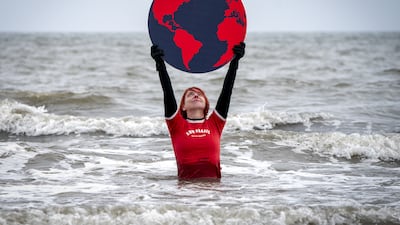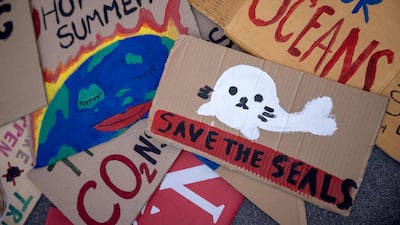Humans have done so much damage to the planet — from wiping out entire species to cutting down countless trees — that it is easy to lose hope.
The world's supplies of clean water are in deep trouble thanks to humanity's “vampiric” overconsumption of life's essential resource, UN Secretary General Antonio Guterres warned on Wednesday.
Speaking at the opening session of a historic international water conference, Mr Guterres accused the global community of breaking the water cycle, destroying ecosystems and spoiling groundwater.

He said countries are “draining humanity’s lifeblood through vampiric overconsumption and unsustainable use”.
But there does appear to be light at the end of the tunnel.
The recent passage of the Inflation Reduction Act, signed into law on Tuesday by US President Joe Biden, includes more than $360 billion to address climate change, the country's largest ever investment to reduce greenhouse gas emissions.
Experts estimate the law will reduce carbon emissions by about 40 per cent compared to 2005 levels by the end of the decade through investing in wind and solar power and by making it easier and cheaper to buy electric vehicles.
Worldwide, people switched off their lights and unnecessary electrical appliances from 8.30pm to 9.30pm on Saturday, as part of Earth Hour.
There are some things we can all do right now to help the planet.
Limit meat and dairy consumption or go vegan
Food production and consumption — especially meat — are the leading contributors to climate change and global warming.
A single cow, for example, produces between 70 and 120 kilograms of the planet-heating gas methane per year, the EPA reported.
“The foods that you choose to eat are the single most impactful action you take on a daily basis when it comes to the environment and your impact on the environment,” said Dana Ellis Hunnes, a registered dietitian and professor.
Your favourite vegan celebrities — in pictures
Dr Hunnes said a typical American consumes between about 70 to 115 kilograms of animal products per year, plus an average of a litre of dairy products per day.
“All those animal products and dairy require huge amounts of land and water to produce and create large amounts of emissions,” she said.
Every half-kilogram of beef produced requires up to a tonne of water and 10 times more land than the same amount of grain or seed, Dr Hunnes said. About 3.8 litres of dairy milk requires almost 3,800 litres of water. Non-dairy milk, however, requires only a tenth of that amount.
“It has been postulated that one cheeseburger uses the same amount of water as taking showers for three months,” said Ms Hunnes.
“If instead we switch to a plant-based burger, we save 80 days' worth of showers out of those 90 for the cheeseburger.”
Want versus need
Shop till you drop has taken on a whole new meaning.
Unchecked consumerism causes harm to the planet in myriad ways, including deforestation, the collapse of ecosystems and the creation of health hazards.
During the first few months of pandemic, many remarked on the bluer skies and fresher air. That’s because cars and delivery vehicles had shifted into park all around the world.
“We saw the biggest and deepest drop in carbon emissions ever recorded through that global slowdown in that production and consumption system,” said author and journalist JB MacKinnon.
In The Day the World Stops Shopping: How Ending Consumerism Saves the Environment and Ourselves, MacKinnon says that obsessive consumerism is the one of biggest contributors to the destruction of the planet.
So before hitting the “buy” button on Amazon, ask yourself: do I want this or do I need this? And keep in mind that, once it breaks, it’s likely to be headed for the landfill, where — depending on the materials used to make it — it could remain for several hundred years.
Home sweet office
The pandemic disproved the idea that people needed to be at the office to be productive members of a team. More and more offices are now ditching the brick-and-mortar model for working from home — to the benefit of the planet.
If employees were able to work from home at least half of the week, greenhouse gas emissions could be reduced by up to 54 million tonnes, Global Workplace Analytics reported.
When employees in the UK were allowed to telecommute part-time, a Breathe London study showed that greenhouse gas emissions fell by 25 per cent during morning commutes and 34 per cent during evening commutes.
Six simple things you can do right now
We can't change the world overnight — but before the existential angst sets in, here are a few things you can start doing now to help the planet.
Compost. This process of recycling organic waste enriches soil, helping it retain moisture and suppress plant diseases and pests — and it also reduces dependence on harmful chemical fertilisers.
Plant a tree. According to Nature, about 15 billion trees are cut down every year. Add your own contribution to the 1.9 billion trees that are planted each year.
Install a drought-resistance garden. These gardens use much less water than lawns while also growing useful plants.
Stop watering your lawn or at least wait until early morning. Water scarcity is a growing concern around the world and regions from the Horn of Africa to the western US are struggling with unprecedented droughts. Do your part and limit wasting water on your lawn.
Follow pages such as Waste Free Planet or your favourite vegan celebrity on Instagram. There are lots of sites and pages to follow that feature tips on how to help the planet.
Unplug vampire appliances. Unplug electronics, chargers, and appliances when not in use. Turn off monitors when you step out. Better yet, use a power strip to turn all devices off at once and watch for energy savings.
Additional reporting by Holly Aguirre











































































